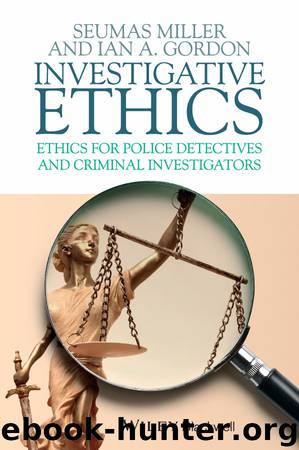Investigative Ethics by Miller Seumas; Gordon Ian A.; & Ian A. Gordon

Author:Miller, Seumas; Gordon, Ian A.; & Ian A. Gordon
Language: eng
Format: epub
ISBN: 9781405157735
Publisher: John Wiley & Sons, Incorporated
Published: 2014-03-13T11:48:07+00:00
6.2 Property Crime
Unlike a murder victim, the victim of a property crime is available, at least in principle, to provide evidence in relation to the crime, for instance, the nature of the goods stolen, the where, when, and how of the crime. Unfortunately, property crimes are often done in secrecy and so, unlike, say, assaults, the victim is not able to identify the offender; moreover, there are often no witnesses to the crime. On the other hand, the item stolen is available as evidence, if it can be retrieved. If, for example, the stolen item is found to be in the possession of person A, then this is (prima facie) evidence that A stole it or at least that A knows who stole it (since A presumably received it from this person).
The direct victim of a property crime is sometimes an organization, for example, a defrauded corporation. However, even in these cases the indirect victim – the ultimate victim, so to speak – is a person or persons, for example, the shareholders or the customers (corporate fraud), the bank's depositors (bank robbery), the community at large (tax evasion). This is so even if the precise amount of the property loss suffered by any individual person as a consequence of the crime cannot be specified because the impact of the crime is too indirect and diffuse, as when a corporation passes on the loss to its customers by way of increased charges.
For a number of reasons not all property crimes that are committed are actually reported to the police. These reasons include the following ones.
If the amount involved is trivial, or there is a belief, on the part of the victim, that the police would or could do nothing about it. This attitude often prevails in areas where there is a high volume of crime and the population has lost faith in the police being able to stop criminal activity.
Nonreporting may occur in areas of high minority ethnic populations, in particular those newly arrived in a country, who remember the attitude of the police in their former homeland who were perhaps lazy, indifferent, or corrupt, so they consider the police in their new country may be the same.
The offender is known to the victim and the victim wants to avoid creating a police record for that person, perhaps a relative or child of a close friend, neighbor, and so on.
The victim may want to personally deal with the matter whether by receiving restitution in the form of money or other favor from the offender or, more problematically, by imposing some form of retribution on the offender. Such retribution-seeking behavior may result in a more serious crime being committed (e.g., assault), particularly in cases where one criminal has stolen from another. Another scenario could include extortion, where the victim seeks to profit from the crime being committed by the offender getting, for example, sexual gratification or confidential information from the offender who now becomes a victim.
The victim is insured and simply makes a claim on their insurance policy.
Download
This site does not store any files on its server. We only index and link to content provided by other sites. Please contact the content providers to delete copyright contents if any and email us, we'll remove relevant links or contents immediately.
| Ethics | Etiquette |
| Fashion & Image | Health & Stress |
| Motivation & Self-Improvement | Work Life Balance |
| Workplace Culture |
Tools of Titans by Timothy Ferriss(7768)
Change Your Questions, Change Your Life by Marilee Adams(7344)
Deep Work by Cal Newport(6524)
Man-made Catastrophes and Risk Information Concealment by Dmitry Chernov & Didier Sornette(5624)
Playing to Win_ How Strategy Really Works by A.G. Lafley & Roger L. Martin(5405)
Digital Minimalism by Cal Newport;(5354)
Big Magic: Creative Living Beyond Fear by Elizabeth Gilbert(5325)
The Slight Edge by Jeff Olson(5191)
The Motivation Myth by Jeff Haden(4982)
Ego Is the Enemy by Ryan Holiday(4922)
Stone's Rules by Roger Stone(4837)
The Laws of Human Nature by Robert Greene(4750)
Tuesdays with Morrie by Mitch Albom(4373)
Rising Strong by Brene Brown(4185)
Eat That Frog! by Brian Tracy(4128)
Skin in the Game by Nassim Nicholas Taleb(3955)
The Money Culture by Michael Lewis(3819)
Bullshit Jobs by David Graeber(3806)
Skin in the Game: Hidden Asymmetries in Daily Life by Nassim Nicholas Taleb(3713)
